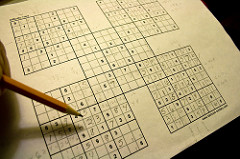 The brain is not really a muscle, but there’s a lot of advice out there to treat it like one and exercise it. A huge industry has been built around this concept. But this post comes with a disclaimer: I recently read an article stating that “brain-training effects might be nothing more than placebo effects” and questioning how long those positive effects last. So you might think twice about spending a lot of money on brain-training programs and gurus, but there’s a lot you can find for free at the library to boost your brain power. What could it hurt to do a little mental calisthenics?
The brain is not really a muscle, but there’s a lot of advice out there to treat it like one and exercise it. A huge industry has been built around this concept. But this post comes with a disclaimer: I recently read an article stating that “brain-training effects might be nothing more than placebo effects” and questioning how long those positive effects last. So you might think twice about spending a lot of money on brain-training programs and gurus, but there’s a lot you can find for free at the library to boost your brain power. What could it hurt to do a little mental calisthenics?
Now might be a good time to brush up on logic, fallacy and argument with the elections coming up and the pitches flying. It’s always nice to know when someone is making a deceptive, misleading or unsound argument, whether it’s a “straw-man” argument or “begging the question.” Jamie Whyte takes you on a humorous journey through various logical fallacies in “Crimes Against Logic: Exposing the Bogus Arguments of Politicians, Priests, Journalists, and Other Serial Offenders.”
Brain teasers, puzzles, riddles and games are some of the most recommended ways of exercising your brain. Of course, chess has been touted pretty much forever as a brain changer, so you could try a general chess book or check out “The Immortal Game: A History of Chess, or How 32 Carved Pieces on a Board Illuminated Our Understanding of War, Art, Science, and the Human Brain.” And there is one name that seems to stand out when it comes to games and puzzles — Will Shortz. Look for 150 of his favorite word puzzles in “Games Magazine Presents Will Shortz’s Best Brain Busters.”
If you would like to just boost your creativity a bit, Nick Bantock of the beautiful Griffin & Sabine books can guide you with creative exercises in “The Trickster’s Hat: A Mischievous Apprenticeship in Creativity.” Bantock’s 49 exercises include a materials list and the time required. They are designed to “encourage you to forget your destination while you meander through the wondrous world that awaits you in the periphery of your mind’s eye.”
Memory boosting books have the best titles! How can you resist a title like “A Sheep Falls Out of a Tree”? My favorite is “Moonwalking With Einstein” by Joshua Foer I don’t know that this book will help me remember where I put my car keys, but it certainly gave me a lot to think about as far as the role of memory in culture and our relationships with others. Foer also provided a few fun tricks that really do work to remember random things. My favorite quote: “Our ability to find humor in the world, to make connections between previously unconnected notions, to create new ideas, to share in a common culture: All these essentially human acts depend on memory. Now more than ever, as the role of memory in our culture erodes at a faster pace than ever before, we need to cultivate our ability to remember. Our memories make us who we are. They are the seat of our values and source of our character.”
From my experience, if you want to keep your mind active, just read. Albert Einstein said, “If you want your children to be intelligent, read them fairy tales. If you want them to be more intelligent, read them more fairy tales.” And to quote Neil Gaiman, “Read. Read anything. Read the things they say are good for you and the things they claim are junk. You’ll find what you need to find. Just read.” I couldn’t agree more.
“The more that you read, the more things you will know. The more that you learn, the more places you’ll go.”
― Dr. Seuss, “I Can Read With My Eyes Shut!”


